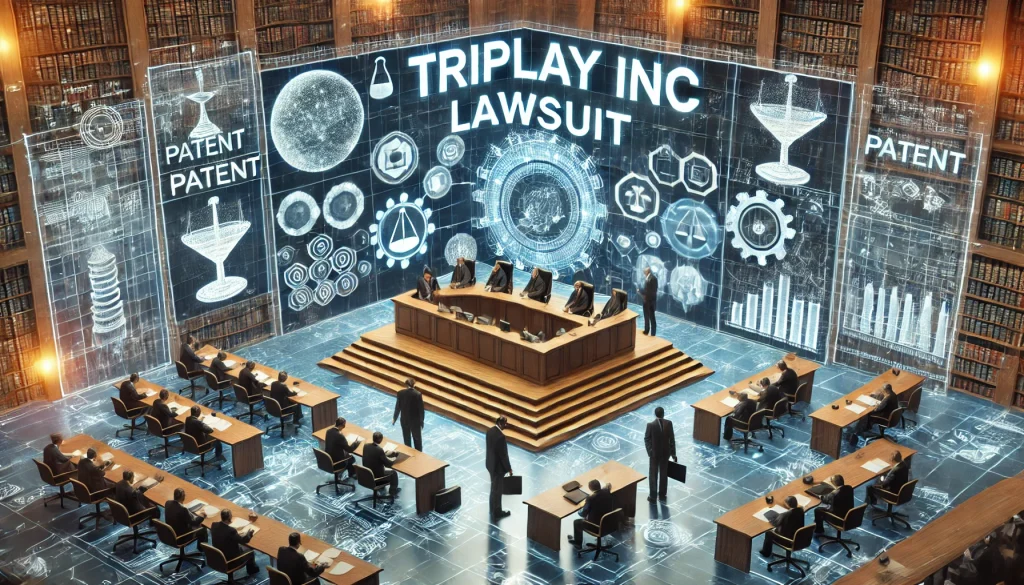The TriPlay Inc Lawsuit has captured significant attention in the technology and legal sectors. This case revolves around patent disputes, with TriPlay Inc claiming infringement on its innovative messaging technology. The lawsuit highlights the complexities of protecting intellectual property in a rapidly evolving digital landscape.
At the heart of the TriPlay Inc Lawsuit is the company’s effort to safeguard its patents, which are integral to its proprietary technology. Such legal battles emphasize the importance of intellectual property rights for tech companies striving to maintain a competitive edge.
The implications of the TriPlay Inc Lawsuit extend beyond the courtroom. The outcome has the potential to set new precedents in how patent laws are interpreted and enforced in the technology industry. It serves as a reminder of the critical role legal frameworks play in fostering innovation while protecting inventors’ rights.
Key Facts About the TriPlay Inc Lawsuit
The TriPlay Inc Lawsuit is centered on allegations of patent infringement. TriPlay Inc claims that a major tech company unlawfully used its patented messaging technology, which integrates multimedia with real-time communication. This innovation is crucial for enhancing user experience in messaging platforms.
The lawsuit demonstrates the challenges faced by smaller tech companies in defending their intellectual property against industry giants. Patent infringement claims often involve complex legal and technical analyses, making these cases lengthy and resource-intensive.
The outcome of the TriPlay Inc Lawsuit has potential ramifications for both parties. It could either strengthen TriPlay’s position as a leader in messaging innovation or expose vulnerabilities in its patents.
Key Facts in Brief:
- Core issue: Patent infringement.
- Industry involved: Messaging technologies.
- Stakeholders: TriPlay Inc and the defendant (name depending on case details).
- Implications: Technology innovation, legal precedents, and financial stakes.
Legal Context of Patent Disputes in Technology
Patent disputes like the TriPlay Inc Lawsuit arise frequently in the tech industry, as companies strive to protect their innovations. Patent law aims to balance innovation incentives with fair competition, creating a dynamic but contentious field.
In the tech sector, software patents are particularly challenging due to their abstract nature. Courts often face difficulties determining the novelty and non-obviousness of such patents. The TriPlay Inc Lawsuit highlights these challenges as it involves messaging technology—a domain where patents often overlap.
Legal standards, like those outlined in Section 101 of the Patent Act, are pivotal in determining the validity of patents. These laws are frequently debated, with critics arguing they sometimes stifle rather than promote innovation.
Table: Challenges in Patent Disputes
| Challenge | Impact on Case |
| Abstract Patents | Difficult to enforce |
| Overlapping Claims | Risk of invalidation |
| High Legal Costs | Barrier for smaller firms |
The broader legal context of patent disputes underscores the high stakes for tech companies defending their intellectual property in an era of rapid innovation.
Timeline of Events in the TriPlay Inc Lawsuit
The timeline of the TriPlay Inc Lawsuit provides a clear view of its progression and key milestones.
- Filing of the Lawsuit: TriPlay Inc initiated the case, alleging patent infringement. The complaint detailed how the defendant’s messaging platform violated TriPlay’s patents.
- Pre-Trial Motions: Both parties engaged in procedural motions, including requests for dismissals and jurisdictional debates.
- Discovery Phase: A critical period where technical and legal experts analyzed the patents in question and gathered evidence.
- Trial Commencement: The court reviewed arguments from both sides, including expert testimonies on the technical workings of the patents.
- Court Rulings or Settlements: Depending on the outcome, the case might end in a court ruling, settlement, or appeal.
The timeline underscores the complexity of patent litigation, where each stage can span months or even years.
How the TriPlay Inc Lawsuit Could Impact Messaging Platforms
The TriPlay Inc Lawsuit could have far-reaching consequences for messaging platforms worldwide. If TriPlay’s claims are upheld, it could enforce stricter licensing requirements for technologies in this space.
Messaging platforms often rely on shared technologies to innovate. A legal precedent set by this case may compel companies to reevaluate their tech stacks, leading to potential disruptions in their services or increased operational costs.
If TriPlay loses, it could signify greater challenges for smaller firms to defend their intellectual property against larger corporations. On the other hand, a victory for TriPlay might encourage startups to more aggressively patent and protect their innovations.
Possible Outcomes and Impacts:
- Licensing costs could rise for messaging platforms.
- Startups may invest more in legal frameworks for their innovations.
- Patent laws might be refined, affecting future disputes.
Understanding the ‘475 Patent in the TriPlay Inc Case
The ‘475 Patent lies at the heart of the TriPlay Inc Lawsuit. This patent covers a unique method of integrating multimedia elements into messaging services, enhancing real-time communication.
The ‘475 Patent describes an innovative approach to ensuring compatibility between diverse device types, ensuring seamless user experiences. Such technologies are integral to the functionality of modern messaging platforms.
Patent experts argue that the validity of the ‘475 Patent is a key issue in the lawsuit. Courts will examine whether the patent satisfies the requirements of novelty, non-obviousness, and utility under U.S. patent law.
Key Aspects of the ‘475 Patent:
- Focus: Multimedia integration in messaging.
- Relevance: Critical for cross-platform communication.
- Challenge: Demonstrating non-obviousness amid similar patents.
The outcome of this case will likely influence how courts handle patents in rapidly evolving tech domains like messaging and multimedia integration.
The Importance of Patent Protections in Tech Innovations
Patent protections are vital for fostering innovation in the technology sector. They provide inventors with exclusive rights to their creations, enabling them to capitalize on their ideas without fear of replication by competitors.
For tech companies, patents can serve as both defensive and offensive tools. They protect against unauthorized use of proprietary technology while also allowing businesses to leverage their portfolios in licensing agreements or litigation. This dual role of patents is particularly evident in high-stakes cases like the TriPlay Inc lawsuit.
However, obtaining patents is a complex process. Companies must demonstrate that their inventions are novel, non-obvious, and useful. These criteria ensure that patents reward genuine innovation rather than incremental improvements.
Challenges in Patent Protections:
- High costs of filing and maintaining patents.
- Global discrepancies in patent laws.
- Difficulties in enforcing rights against large corporations.
Without robust patent protections, tech companies could struggle to sustain innovation in competitive markets, undermining the industry’s growth potential.
TriPlay Inc’s Role in Advancing Communication Technologies
TriPlay Inc has emerged as a pioneer in the field of communication technologies. Its focus on integrating multimedia with messaging has positioned the company as an innovator in enhancing user experiences.
The company’s patented solutions, including the ‘475 patent, emphasize seamless interaction across diverse devices and platforms. This innovation addresses a critical need in the digital age: compatibility and real-time communication.
TriPlay Inc’s technology is particularly relevant in industries like e-commerce, social networking, and customer support, where robust communication tools are essential. By bridging the gap between multimedia and messaging, TriPlay has carved a niche for itself.
TriPlay’s Key Contributions:
- Development of cross-platform messaging tools.
- Focus on multimedia integration for real-time communication.
- Advancement of user-friendly interfaces for global audiences.
Through its legal battles, including the TriPlay Inc lawsuit, the company has highlighted the importance of protecting its intellectual property to maintain its role as an industry leader.
Court’s Perspective on Patent Disputes in the Tech Industry
Courts play a critical role in resolving patent disputes like the TriPlay Inc lawsuit. Their decisions often hinge on interpreting complex legal and technical details, including the validity and scope of patents.
In cases involving tech patents, courts must balance the need to protect innovation with ensuring fair competition. This often involves assessing whether the patents in question meet the legal standards of novelty and non-obviousness.
Judges and juries rely heavily on expert testimonies and technical analyses. These inputs help them navigate the intricacies of software patents, which are often abstract and challenging to define.
Table: Factors Courts Consider in Patent Disputes
| Factor | Description |
| Patent Validity | Novelty, non-obviousness, utility |
| Infringement Claims | Degree of similarity to the patent |
| Industry Impact | Potential for stifling innovation |
Court rulings not only resolve individual disputes but also set precedents that influence future patent litigation, shaping the legal landscape for tech companies.
Wider Implications of the TriPlay Inc Lawsuit on Tech Startups
The TriPlay Inc lawsuit serves as a cautionary tale for tech startups navigating the challenges of protecting their intellectual property. Startups often face significant hurdles, including high legal costs and the risk of litigation from established players.
A favorable outcome for TriPlay Inc could encourage startups to aggressively pursue and defend patents. It would signal that smaller companies can hold their ground against larger competitors, fostering a more equitable tech ecosystem.
Conversely, if the lawsuit highlights weaknesses in TriPlay’s patents, it may deter startups from engaging in costly legal battles. Instead, they may focus on alternative strategies like collaboration or licensing.
Implications for Startups:
- Increased focus on robust patenting strategies.
- Greater awareness of the financial risks of litigation.
- Potential for changes in patent filing practices to strengthen claims.
The lawsuit also underscores the importance of legal preparedness for startups, emphasizing the need for comprehensive strategies to protect their innovations while managing the risks of litigation.
How Legal Battles Influence Technological Advancements
Legal battles like the TriPlay Inc lawsuit have a significant impact on technological advancements. On one hand, these disputes ensure accountability by preventing companies from exploiting patented technologies without permission. This protection incentivizes innovation and investment in R&D.
However, frequent patent litigations can slow down the pace of technological progress. Companies may divert resources from innovation to legal defenses, stifling creativity and productivity.
In some cases, lawsuits lead to cross-licensing agreements, enabling broader access to patented technologies. This collaboration can foster innovation by allowing companies to build on each other’s advancements.
Impact on Innovation:
- Encourages patenting of novel ideas.
- Protects smaller innovators from exploitation.
- Can hinder progress due to litigation costs and delays.
While the intent of such legal battles is to protect innovation, the execution often reveals a fine line between fostering competition and creating barriers to advancement.
Challenges Faced by TriPlay Inc During the Lawsuit
TriPlay Inc Lawsuit encountered numerous challenges during its legal battle. Defending a patent infringement lawsuit requires significant financial resources, which can strain smaller companies.
Another challenge was proving the validity of its patents. Patent litigation often involves complex technical arguments to demonstrate that the invention is novel and non-obvious.
The lawsuit also placed TriPlay’s reputation under scrutiny. In the tech industry, legal disputes can influence how companies are perceived by investors and customers.
Key Challenges for TriPlay Inc:
- High litigation costs.
- Proving patent validity against established players.
- Managing public perception and business continuity.
These hurdles highlight the difficulties faced by smaller tech companies when taking on legal battles with industry giants.
Lessons for Startups from the TriPlay Inc Lawsuit
The TriPlay Inc lawsuit offers valuable lessons for startups navigating the complex landscape of patent protections and litigation.
First, startups should prioritize obtaining strong, defensible patents. This involves ensuring that inventions meet all legal requirements and are drafted with precision to withstand challenges.
Second, legal preparedness is critical. Startups must anticipate potential disputes and establish a clear strategy for addressing them, including budgeting for litigation costs.
Lessons for Startups:
- Invest in comprehensive intellectual property protections.
- Seek expert legal advice when filing patents.
- Consider collaboration or licensing to avoid disputes.
Lastly, the case underscores the importance of balancing innovation with risk management. Startups should weigh the benefits of pursuing litigation against the potential costs and impacts on their business.
Navigating Intellectual Property Challenges in Digital Platforms
Digital platforms face unique intellectual property (IP) challenges due to the rapid pace of technological innovation. Companies must navigate overlapping patents, ensuring their technologies do not infringe on existing IP while also protecting their innovations.
For smaller companies, like TriPlay Inc, the challenge lies in competing with larger corporations that have extensive patent portfolios. Smaller players may also face difficulties in enforcing their rights due to high litigation costs.
Collaborative approaches, such as cross-licensing agreements or consortiums, can help mitigate these challenges. These strategies allow companies to share technologies while reducing the risk of disputes.
Table: Key IP Challenges for Digital Platforms
| Challenge | Potential Solution |
| Overlapping Patents | Cross-licensing agreements |
| Enforcement Costs | Alternative dispute resolutions |
| Rapid Tech Evolution | Continuous IP strategy updates |
By adopting proactive IP management strategies, companies can minimize risks while fostering innovation in the digital era.
The Future of Tech Patents After the TriPlay Inc Lawsuit
The outcome of the TriPlay Inc lawsuit could shape the future of tech patents in several ways. A victory for TriPlay may encourage more companies to patent their innovations and pursue litigation to enforce their rights.
If the court highlights weaknesses in TriPlay’s patents, it could lead to stricter scrutiny of patent applications. This may push companies to invest in stronger, more defensible patents.
Additionally, the lawsuit may prompt reforms in patent law, especially in areas like software and digital technologies. Policymakers may consider simplifying the criteria for patent validity to reduce disputes.
Possible Changes in Tech Patents:
- More rigorous patent application processes.
- Greater emphasis on non-obviousness for software patents.
- Increased collaboration to avoid litigation.
The case serves as a critical example of how legal outcomes can influence both company strategies and broader industry standards in intellectual property management.
Conclusion
The TriPlay Inc lawsuit underscores the critical importance of intellectual property in the technology sector. It highlights how patents serve as both a shield and a weapon for companies aiming to protect their innovations while navigating a competitive industry. For TriPlay, this legal battle was not just about safeguarding its technology but also about asserting its place in a rapidly evolving market.
Legal disputes like this have broader implications, influencing how companies, both large and small, approach innovation and intellectual property. While such lawsuits can sometimes hinder technological progress due to prolonged litigation, they also emphasize the need for robust patent systems to foster creativity and fair competition.
For startups and smaller tech firms, the case offers a valuable lesson in balancing innovation with legal preparedness. As the technology landscape grows more complex, businesses must adopt proactive strategies to protect their intellectual assets while collaborating to drive industry-wide advancements.




